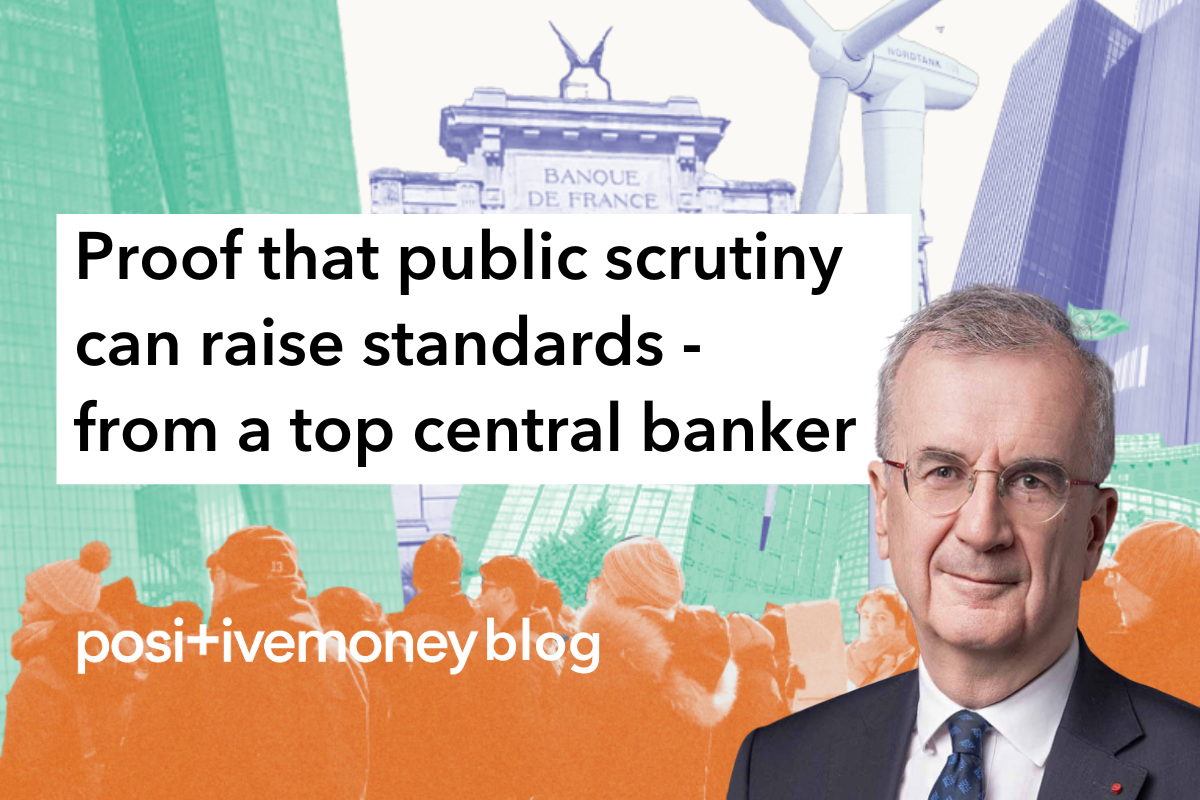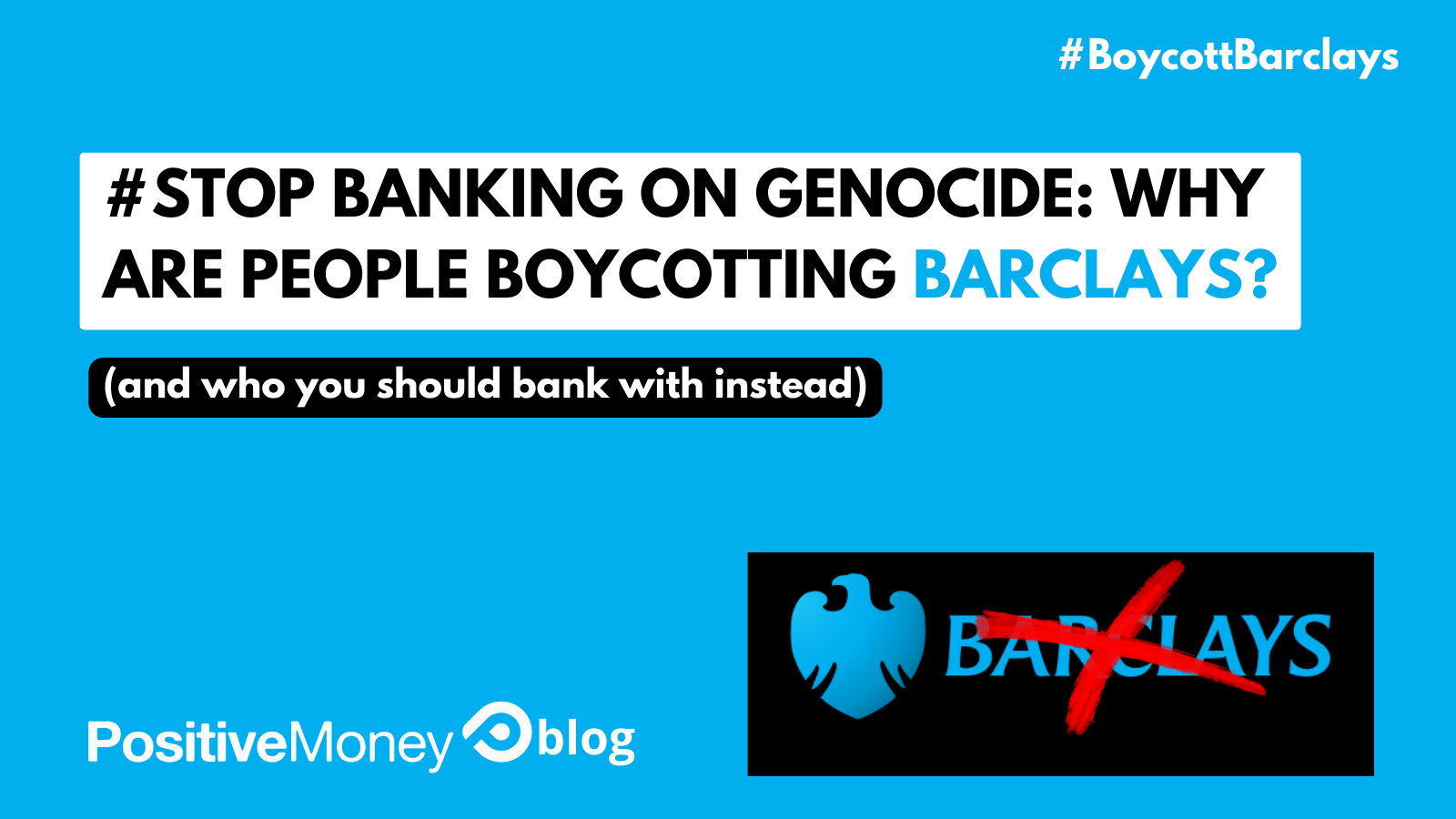
UKEU
18 February 2026
January 25, 2024
UK banks like Barclays are financially complicit in the ongoing genocide in Gaza, standing as the 6th biggest creditor in Europe of companies involved in illegal Israeli settlements. The Palestine Solidarity Campaign is organising a day of action on 27th January and mass account closures on 9th February to challenge Barclay’s financial ties. #BoycottBarclays is a reiteration of the anti-apartheid movement’s tactics in the 1970s and 1980s in solidarity with Black South Africans.
Switching to an ethical bank is one way to resist our predatory banking system and stand against global injustice and colonial violence. If you’re considering taking part in the boycott, you might want to consider joining a credit union or mutually-owned bank that works in the interests of the public good �– not shareholders.
How much do you really know about your bank and what it does with your money? In recent years, the climate justice movement has raised the alarm on the disturbing links between major UK banks’ financing of fossil fuels that are accelerating the degradation of the planet. Since 2016, the 5 biggest UK banks have pumped billions of pounds into oil, gas and coal projects at a time when financial firms should be phasing out fossil fuels and invigorating the shift to renewables.
However, this is quite challenging when profit margins and shareholder payouts take precedence over net zero targets, which is why we’re lumbered with policymakers who are heavily influenced by a powerful finance lobby with vested interests in fossil fuels. And unsurprisingly, this overreliance on fossil fuels is being exacerbated by the UK government who are pushing through the controversial Offshore Petroleum Licensing bill last week, which will allow even more oil and gas licences to be approved. The green transition isn’t going to happen overnight, but It’s clear how greed and exploitation are pervasive symptoms of our broken economy, meaning that policies that provide a social or a common good are met with heavy resistance. Consequently, legislation that entrenches profit-maximisation for big oil and gas firms and big banks are hastily passed to the detriment of all of us and the future of a healthy planet.
But UK banks have even seedier and nefarious financial ties that are extremely unsettling. The ongoing genocide in Palestine has intensified calls for an immediate ceasefire and sparked an international campaign supporting Palestinians in their fight against oppression. Campaigners have been raising awareness on the economic ties a vast number of UK institutions have with companies that are providing Israel with the military and technological equipment to facilitate its oppressive regime.
The Boycott, Divestment and Sanctions (BDS) movement have been instrumental in mapping out strategic boycott and divestment targets to hold corporations accountable for their role in Israel’s armed assault on Palestinians. These range from consumer boycotts of goods and services (which you might have seen on social media concerning Mcdonald’s) to pressuring governments, investment funds and city councils to cut financial ties with companies facilitating military repression in the occupied West bank. Both campaign group War on Want and the Palestine Solidarity Campaign have been vocal about the role UK banks play in Israel’s occupation, with the former releasing the report, Barclays Bank: Arming Apartheid in 2022 whilst the latter have been organising the more recent Boycott Barclays Bank campaign.
Barclays is amongst several other major UK banks that are financially complicit in upholding illegal Israeli settlements. The 2023 Don’t Buy Into Occupation report found that 776 European financial institutions are involved with 51 companies linked to illegal Israeli settlements. UK offenders include HSBC who provided £7.3 billion in loans alongside Santander, Lloyds and Natwest providing companies billions of pounds in investments as well. The complicity of UK financial firms in oppressive regimes is horrifying and reinforces how our financial system perpetuates human suffering, displacement and environmental catastrophe, simply because it’s profitable and works in the interests of solidifying Western imperialism and sustaining the bottom-line of the biggest corporations.
That’s why Boycott Barclays aims to send a clear message to Barclays senior management that their involvement in repressive regimes has a financial cost. The campaign also recognises the shared struggle of international movements past and present. Barclays was a strategic target by the anti-apartheid movement during the 1970s and 1980s in response to the brutal oppression of Black South Africans carried out by the majority-white colonialists. Barclays widely benefited significantly from white-majority rule so UK activists expressed solidarity with Black South Africans by closing Barclays accounts and engaging in direct action until the bank eventually withdrew support in 1986.
This acknowledgement of this ‘shared struggle’ for freedom, justice and peace has been reinvigorated over the past three months, marked by widespread marches and actions taking place all over the world in solidarity with Palestinians. One discernible feature is the prominence and acceptance of intersectionality within the movement for Palestinian liberation, aligning trade unionists, climate justice campaigners, students amongst indigenous rights, gender, anti-racist, anti-imperialist and anti-capitalist movements, highlighting the interrelationship between the systemic roots of globalised injustice whilst building solidarity that surpasses borders, time zones and identities.
This intersection between anti-imperialism and climate justice has been identified amongst campaigners already taking action against Barclays. Last Saturday, a coalition of Cambridge protestors held a ‘die-in’ at a local branch demanding an end to their investments in weapons and fossil fuels, as well as a similar protest that was held outside a Barclays branch in Oxford. And the Palestine Solidarity Campaign (PSC) have coordinated ‘a ‘Day of Action for Palestine’, with protests set to happen all over the country urging Barclays to cut financial ties with Israeli arms companies. The PSC is also rallying thousands of people to pledge to close their Barclays account on 9th February, hoping a mass account closure on the same day will build enormous pressure on Barclays to stop bankrolling genocide.
We’ve been calling out UK banks’ carbon-intensive investments that are accelerating the climate emergency, so it’s paramount that the UK banks’ role in upholding repressive regimes is subject to scrutiny and that we lend our support and full solidarity to the divestment campaign and boycott. However, closing a bank account can be easier said than done. We’re an independent, non-profit organisation unaffiliated with any bank and would encourage people to exercise due diligence when choosing an alternative and/or ethical bank.
Back in September, we published a guide with Switch It Green on ethical banks that pride themselves on sustainability and social responsibility as their core operational values. But the reality is, under our current predatory, classist and racist banking system there are limitations to the parameters of ‘ethical’ values amongst alternative banks, even ones with seemingly high green credentials. For instance, at first glance, you might praise the Co-operative’s Ethical Policy that ensures customer’s money, ‘isn’t ‘financing of fossil fuels, oppressive regimes, unethical labour practices.’ But unfortunately, the bank is owned by shareholders which means there is still an obligation to maximise profits.
Alternative banks to consider include Nationwide, a building society that prides itself as being accountable to its members – not shareholders. Triodos is another ethical bank, but be mindful their current accounts hold a nominal £3 monthly fee. If you’re looking for a place to move savings, credit unions are democratically-owned financial institutions that are favourable alternatives to banks. The first of its kind was established in the UK in 1964 by British Caribbean people who faced discrimination from mainstream banks. By operating exclusively within local communities, credit unions promote collective economic empowerment and community cohesion that is notably absent within the modus operandi of the majority of the biggest banks.
When looking to switch your bank account, consider using the current account switch service that does most of the heavy lifting for you and is free. Whichever alternative/ethical bank you decide to choose, be sure to research your potential new bank’s credentials first so you can be confident your bank aligns with your values and isn’t funding fossil fuels, arms or other unethical investments. And even if you don’t currently bank with Barclays, the Boycott Barclays campaign encourages people to take action by pledging to boycott Barclay’s services in the future. For too long, banks have used our money as collateral to maintain their excessive profiteering in order to satisfy shareholders, they must be held responsible for their complicity in destabilising our environment and displacing communities by financing conflict and climate chaos. It’s our duty to utilise our collective power to call on Barclays to stop funding genocide, crimes against humanity and profiting from human suffering and colonial violence.
There are a multitude of ways to show solidarity with Palestinians so we encourage you to participate in #BoycottBarclays as well as checking out the resources listed below.
Sources, resources and links:
Join the Day of Action to #BoycottBarclays on Saturday 27th January 2024
Companies profiting from Israel’s attack on Gaza
Don’t Buy Into Occupation report 2023 PDF
Find your nearest Credit Union
Solidarity Sessions Episode 2: Stop Arming Israel
The Most Ethical Banks in the UK in 2023
The Current Account Switch Service
Who to follow:
Campaigns Against Arms Trade: Instagram | Twitter
